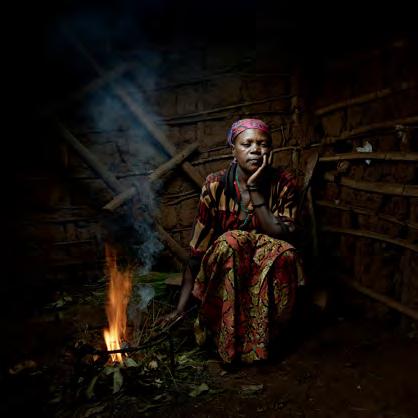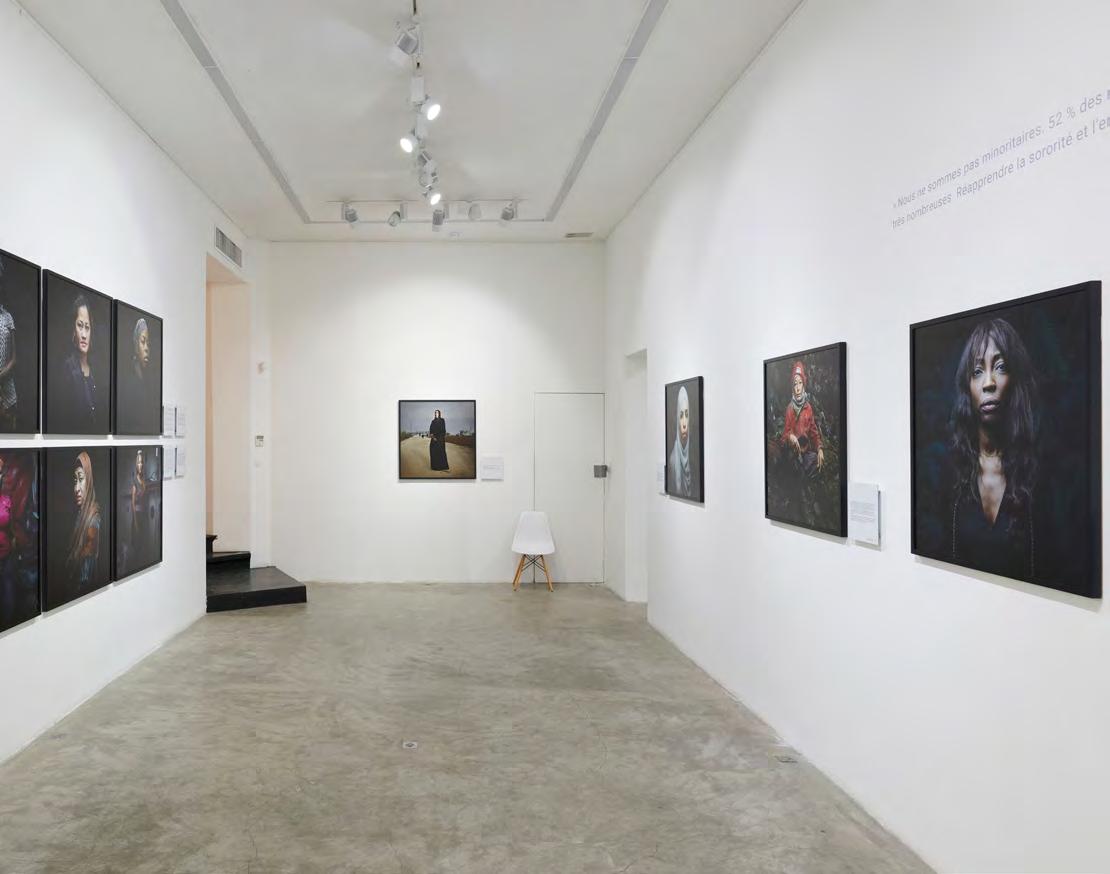
6 minute read
ADVOCACY AND CAMPAIGNS
FRANCE UNSUNG HEROES
Unsung Heroes is a photographic project created jointly by MdM and Denis Rouvre, photographer and longterm partner of the organisation. Launched in 2018, the project showcases the portraits and testimonies of some 60 women, which are brought together in a book and a touring exhibition.
Advertisement
These women and girls, from the areas where MdM is active in Nepal, Palestine, Bulgaria, Colombia, Democratic Republic of the Congo, France and Lebanon, all speak about the institutional, societal, domestic, psychological and physical violence to which they are exposed. Unsung Heroes gives them the chance to give voice to their silent struggles, sustained by daily acts of survival and resilience, as well as their lives spent in the service of every women and indefatigable resistance in the face of injustice. The book which features the portraits and testimonies from the exhibition, published by Textuel, is a continuation of the political, artistic and human gesture that is Unsung Heroes.
Following its launch in Paris in October 2019, the exhibition then moved on to Bordeaux in November. MdM’s intention is to continue presenting this ambitious project in France and around the world in order to spread the words of these women far and wide. The exhibition is therefore due to go on display in Malines in Belgium in 2020 before moving on to Munich in Germany in 2021.
In the village, women are slaves. Equality is a meaningless word. Men object to it, saying that God did not create woman equal to man. We try hard to feed our children and send them to school. I work in the fields, I am active in the village associations – there are sixty-eight of us women, all helping each other out. The women do everything. The men spend their days drinking beer. If a woman dares to make a comment, she gets a slap, even if she’s pregnant. If a woman has no sons, her husband takes another wife and the first wife is thrown out of the family. She’s left in the street, even if she is no longer young. When the husband dies, the eldest son inherits everything, unless there is a will saying otherwise. The wife then no longer has the right to stay in her house or go to her fields, or to any other property left by her husband. The woman always stands behind the man. Behind her husband. Behind her sons. Behind her parents-inlaw. Those with the means to do so can go to school, but cannot receive any higher education. Only the boys can continue on to university. I was able to go to high school. I love children. I’ve been running the association’s infant school for seven years now. I’ve brought together all of the orphans that I’ve found here. Change will come from girls getting an education.

IMMACULÉE, 51, Congolese.
FRANCE WE DON’T CARE (ON S’EN FOUT)
“We don’t care what they look like. We don’t care about religion, ethnicity, what the morality of it is, about what is good or bad. About who is with them or against them. If they don’t speak the same language, we don’t care. We don’t care if they’re down in the street or on the other side of the world. All that counts for us is their health”.
As it does every year in December, MdM reaffirmed its identity, its values and its commitments to the general public. In late 2019, we used the “We Don’t Care” campaign to speak out against the prejudice, stigmatisation and rejection that keep men, women and children excluded from healthcare.
With this simple message, health comes before everything else, we expressed our commitment to individuals who are all too often judged for their way of life, backgrounds and choices…
Instead of simply rejecting these judgments, we are campaigning to ensure that they never act as a barrier to accessing healthcare. Because at MdM we believe we all have the right to health.
By shining a light on the diverse range of people we support without passing judgment, “We Don’t Care” emphasises the fact that, in addition to healthcare and medical services, MdM is also a campaigning organisation. An organisation which takes the fight to the political stage and speaks up in public in order to defend equal rights to healthcare for all.
With support from the PR agency Marcel, which waived its fee for this project, this idea led to the creation of a video shown on television and in cinemas, as well as five posters published in the media and on billboards.
F. exé : 396 x 300 mm - F. visible : 386 x 290 mm _ F. réel : 3960 x 3000 mm - F. visible réel : 3860 x 2900 mm _ Échelle : 1/10 _ QUADRI - PROFIL : ISOCOATED V2 300 _ AFFICHAGE 12M
2
NO S’EN
_ Encrage total = 300 % _ V0 _ impression laser à 100% _ N° dossier : 052997
SI ELLE EST NÉE HOMME OU FEMME, SI ELLE REFUSE LE GENRE QU’ON LUI IMPOSE, ET SI SA FAMILLE A HONTE. TOUT CE QUI COMPTE POUR NOUS, C’EST SA SANTÉ. Annual Report / Advocacy and Campaigns

HARM REDUCTION THE DANGERS OF REPRESSIVE LEGISLATION
Further to the decision by France’s Constitutional Council not to overturn the criminalisation of clients set out in France’s Law 2016-444 of 13 April 2016, aimed at ramping up the fight against the prostitution system and providing support to prostitutes, in December 2019 250 sex workers active in France decided to take the case to the European Court of Human Rights. The move was supported by MdM and 18 community, health and feminist organisations involved in defending the health and rights of all those affected by the sex trade.
In fact, for many years now, numerous organisations and sex workers have been sounding the alarm regarding the dramatic consequences of penalising clients and of repressive policies.
DRUG PRICING CHALLENGE TO THE KYMRIAH PATENT
In July 2019, MdM once again took action against the excessive cost of new and supposedly innovative medicines, launching a challenge to Novartis’ patent covering Kymriah® (Tisagenlecleucel), a gene therapy used in the treatment of cancer, marketed at that time at a cost of €320,000 per patient. This challenge to the patent was unprecedented in more ways than one. It was the first time that a third-sector organisation had challenged a cancer treatment or a cell therapy. Faced with this challenge, Novartis was forced to abandon the contested patent in December 2019. This does not mean that biologically similar versions identical to Tisagenlecleucel can now be manufactured, since other patents covering the same drug have been filed by the company and are still in force. It has, however, highlighted the abuses relating to the granting of patents, the lax attitude displayed by the European Patent Office and by governments which accept undeserved monopolies and, therefore, exorbitant prices. Whether they are victims of exploitation or forced into sex work and whatever their degree of autonomy, all are criticising a measure which subjects them to greater insecurity, weakens their position and exposes them to more violence and increased health risks.
This campaign involving several organisations seeks to see France abandon the adoption of repressive legislation, in line with the recommendations issued by the UN’s highest bodies. Such legislation has effects which are counterproductive and threaten the lives of those concerned. The resources allocated should instead be used to combat all forms of violence, to provide effective support to those experiencing social, health or legal difficulties and to secure an alternative source
of income where desired. MdM had already filed a challenge in 2015 to the patent covering sofosbuvir, a drug used to treat hepatitis C. Through this strategy adapted from the campaigns and advocacy work developed in countries in the global south, in particular in the fight against AIDS, MdM is increasing its involvement with intellectual property and beginning to occupy territory previously held exclusively by the pharmaceutical industry in Europe.









